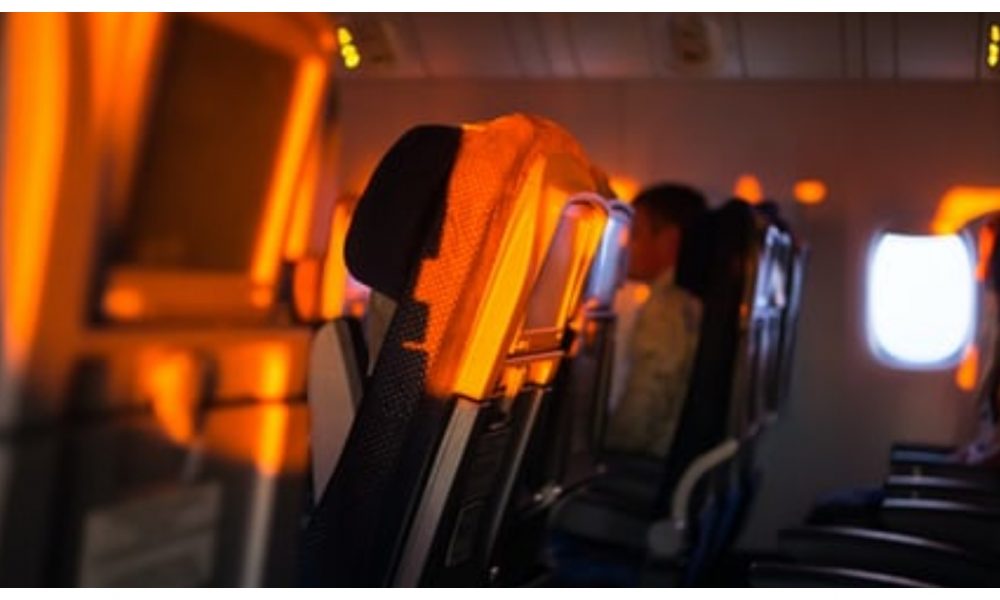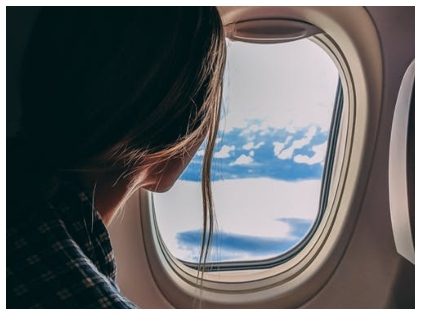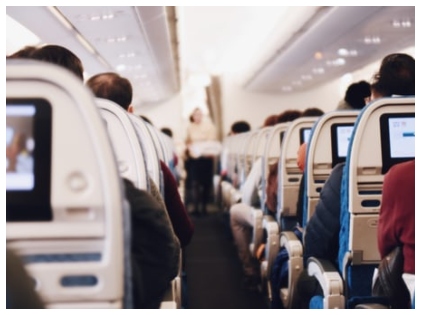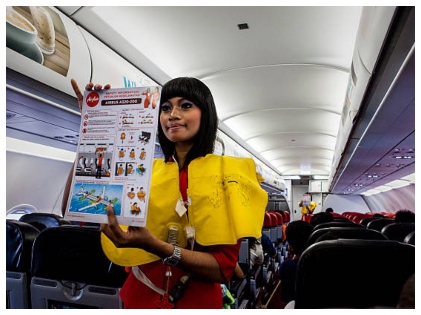
Here Are Five Tips To Ease Your Anxiety On Your Next Flight

For anxious flyers, being in an airplane for hours at a time is a harrowing and seemingly endless attack on the senses — sensory overload, if you will. As the airplane takes off, you feel your ears pop from cabin pressure; you feel your throat constrict and your hands shake; beads of sweat start falling from your forehead, and your mind is abuzz with fear and looming panic.
 Being consumed by a wave of anxiety during the entire duration of a flight can be caused by a variety of factors such as aviophobia (or the fear of flying), trauma, or other mental health conditions. If you’re an anxious flyer, you’re not alone — one in three people suffers from flying anxiety. The next time you fly on a plane, here are five tips to help ease your anxiety:
Being consumed by a wave of anxiety during the entire duration of a flight can be caused by a variety of factors such as aviophobia (or the fear of flying), trauma, or other mental health conditions. If you’re an anxious flyer, you’re not alone — one in three people suffers from flying anxiety. The next time you fly on a plane, here are five tips to help ease your anxiety:
Take Anti-Anxiety or Sleeping Pills
If you’re fine with taking medications during your trip, this tip is the sure way to go. You should know that you will need a prescription for anti-anxiety or sleeping pills. So, weeks before your trip, visit your doctor and explain your situation. He or she might want to try out one or two types to see how well or how poorly you react to the medication. Once you find the right one, make sure to keep them in handy in your carry-on bag. These types of pills usually take effect after 30 minutes to an hour, so take one before boarding your flight. You’ll feel more at ease and eventually zonk out in no time. The only downside is feeling drowsy and muddled afterward, but better that than worrying, right?
Attend A Fearless Flying Class
 While some anxious flyers can rely on medication or certain techniques to help with their anxiety, there are certain people who find flying absolutely terrifying. If you’re part of the latter and you have an upcoming trip, taking a fearless flying class will do you a world of good. Incorporating skill development and cognitive-behavioral techniques, this type of class provides assistance for frequent yet anxious flyers in managing and curbing the onset of anxiety and its symptoms while on a flight.
While some anxious flyers can rely on medication or certain techniques to help with their anxiety, there are certain people who find flying absolutely terrifying. If you’re part of the latter and you have an upcoming trip, taking a fearless flying class will do you a world of good. Incorporating skill development and cognitive-behavioral techniques, this type of class provides assistance for frequent yet anxious flyers in managing and curbing the onset of anxiety and its symptoms while on a flight.
Seek Support From People
 It would be ideal to travel with someone if you’re an anxious flyer. Their presence alone can help alleviate your fear or if you can manage, try engaging in a conversation with them. You can even be open about your anxiety, and by doing so, you will be able to unload and relieve yourself of your nervous thoughts and feelings. If you’re traveling alone, you can let the flight attendant know of your problem, so they can give you extra attention and help in case you have a panic attack.
It would be ideal to travel with someone if you’re an anxious flyer. Their presence alone can help alleviate your fear or if you can manage, try engaging in a conversation with them. You can even be open about your anxiety, and by doing so, you will be able to unload and relieve yourself of your nervous thoughts and feelings. If you’re traveling alone, you can let the flight attendant know of your problem, so they can give you extra attention and help in case you have a panic attack.
Find Healthy Distractions
Numerous aircraft nowadays provide a variety of in-flight entertainment in the form of movies, music, or reading materials. You can make use of these or better yet, bring your own books to read as well as your favorite snacks to help keep you distracted. If airplane noise is one of your triggers, make sure to bring along a pair of earplugs or noise-canceling headphones to block out these sounds. If you can, stand up once in a while and walk up and down the aisle (do make sure that you don’t disturb other passengers!). A little movement or stretching will be a big help in calming your anxiety.
Breathe Deeply
If you find yourself on the verge of a panic attack or if you feel your symptoms worsening, close your eyes and breathe deeply. Inhale through your nose, and exhale through your mouth. Do so until your anxiety subsides. Try to relax your body as well while you practice this relaxation technique. If it doesn’t work, you can opt for meditation — clear your head and visualize being in your favorite place. You’ll start feeling better soon enough.
Try one or all these tips on your next flight. Just remember that you’re safe and sound and that there’s actually no immediate threat to your safety while flying. In fact, you’re in more danger while riding a cab than flying in an airplane, according to statistics. Trying to calm down before or during a flight is easier said than done, and hopefully, these five tips will help banish the fear and melt away the anxiety troubling your mind.
More in Mental Health
-
`
5 Reasons Why Dad’s Side of the Family Misses Out
Family bonds are intricate and multifaceted, often creating a unique tapestry of connections. However, many people notice a peculiar trend: stronger...
July 12, 2024 -
`
A Quick Guide on How to Get Short-Term Disability Approved for Anxiety and Depression
Living with anxiety or depression poses unique challenges, particularly in the workplace, where stress can exacerbate symptoms. For many, short-term disability...
July 5, 2024 -
`
Why Do People Feel Sleepy After Eating?
Is feeling sleepy after eating a sign of diabetes? Well, not directly. There are many reasons why you feel drowsy after...
June 20, 2024 -
`
What Is High-Functioning Depression? Symptoms and Treatment
High-functioning depression may not be a term you hear every day, but it’s a very real and challenging experience for many....
June 13, 2024 -
`
Kelly Clarkson’s Weight Loss Ozempic Journey – Debunking the Rumors
In a refreshing moment of transparency, Kelly Clarkson, the beloved singer and talk show host, sheds light on her remarkable weight...
June 3, 2024 -
`
What Is the Best Milk for Gut Health and Why?
In recent years, the milk section at the grocery store has expanded far beyond the traditional options. While cow’s milk has...
May 30, 2024 -
`
Do Dental Implants Hurt? Here’s All You Need to Know
When you hear “dental implants,” you might wince at the thought of pain. But do dental implants hurt as much as...
May 24, 2024 -
`
5 Key Differences Between A Psych Ward & A Mental Hospital
Curious about the differences between a psych ward and a mental hospital? You are not alone. With the mental health conversation...
May 16, 2024 -
`
It’s Official! “Selling Sunset’s” Christine Quinn & Husband Christian Dumontet Are Parting Ways
Have you ever found yourself unexpectedly engrossed in the personal lives of celebrities, especially when their stories take dramatic turns? Well,...
May 9, 2024










You must be logged in to post a comment Login